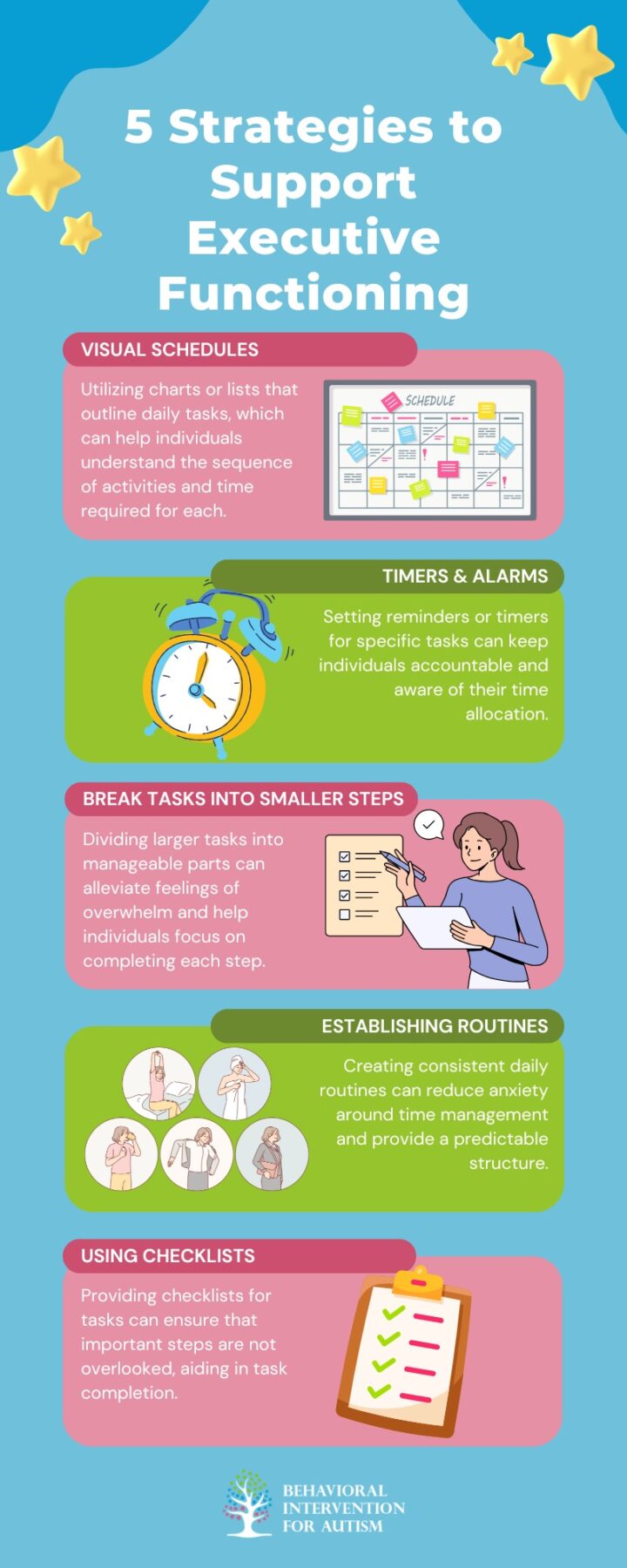
Table of Contents
Autism Spectrum Disorder (ASD) is a neurodevelopmental condition characterized by differences in communication, social interaction, and behavior. Individuals on the autism spectrum may experience varied levels of challenges and strengths, including difficulties with executive functioning, which can impact tasks such as planning, organization, and problem-solving.
Importance of Time Management
Effective time management is crucial for all individuals, as it allows for organizing tasks, meeting deadlines, and reducing stress. For individuals with autism, strong time management skills can lead to greater independence and improved quality of life.
The significance of time management for individuals with autism can be highlighted in the following areas:
Importance | Description |
Task Organization | Helps in sequence planning and prioritization of activities |
Routine Development | Establishes consistency and predictability, benefiting daily routines |
Stress Reduction | Reduces anxiety related to time constraints and uncertainty |
Independence | Fosters self-management skills essential for living independently |
For parents and caregivers, teaching time management skills can help facilitate daily living activities and improve the overall functioning of individuals with autism. Understanding how ASD influences time management is a step towards supporting their daily living skills effectively.
Impact of Autism on Time Perception
Understanding how autism affects time perception is essential for parents and caregivers. We’ll explore the differences in time perception and the challenges individuals with autism face in estimating time.
Differences in Time Perception
Research has shown that individuals with autism may perceive time differently compared to those without the condition. This altered perception can influence their ability to process temporal information and understand the passage of time.
Aspect | Typical Perception | Autism Spectrum Perception |
Duration | Generally consistent understanding | May struggle to grasp time duration |
Passage | Notices the subtle passage of time | Can be less aware of time passing |
Sequencing | Typically follows a linear understanding | May experience challenges with sequential knowledge |
Challenges in Time Estimation
Accurate time estimation is vital for effective time management. However, individuals with autism often confront difficulties in making precise time estimates for various activities, which can lead to planning misconceptions.
Activity | Estimated Time | Actual Time | Typical Misjudgment |
Completing Homework | 30 minutes | 1 hour | 30 minutes overestimate |
Preparing for School | 15 minutes | 45 minutes | 30 minutes underestimate |
Eating a Meal | 20 minutes | 40 minutes | 20 minutes overestimate |
These challenges in time estimation can lead to feelings of frustration and anxiety, which further complicates time management. Understanding these unique aspects of time perception in individuals with autism can guide caregivers in providing better support.
Executive Functioning and Time Management
Executive functioning refers to a set of cognitive skills that are essential for managing tasks, controlling impulses, and organizing activities. For individuals with autism, challenges in executive functioning can significantly impact time management.
Common effects of executive functioning on time management include:
Executive Functioning Challenge | Impact on Time Management |
Difficulty with planning | Struggles to create a schedule or timeline for tasks |
Impulse control issues | Tendency to engage in distractions, leading to time loss |
Problems with task initiation | Delays in starting tasks until the last minute |
Issues with prioritizing | Difficulty focusing on essential tasks over less important ones |
These challenges can make it difficult for individuals with autism to allocate time effectively, track activities, and manage deadlines.
5 Strategies to Support Executive Functioning
Supporting executive functioning requires implementing strategies that can aid in time management. Here are several effective strategies:

By incorporating these strategies, caregivers and individuals with autism can better navigate the complexities of time management and enhance daily living skills.
Sensory Sensitivities and Time Awareness
Sensory sensitivities are common among individuals with autism and can significantly affect their awareness of time. Various sensory inputs can either enhance or hinder their ability to perceive and manage time effectively.
Sensory Overload and Time Perception
Individuals with autism may experience sensory overload, where excessive sensory stimuli can distort their perception of time. This overload can create a sense of being overwhelmed, making it challenging to focus on tasks or allocate time appropriately.
The table below outlines common sensory triggers that may lead to overload, along with potential effects on time perception.
Sensory Trigger | Potential Effects on Time Perception |
Loud Noises | Distraction, loss of track of time |
Bright Lights | Increased anxiety, difficulty concentrating |
Strong Smells | Nausea, disrupted task engagement |
Excessive Movement | Feeling rushed, inability to focus |
These influences can lead to difficulty in maintaining an accurate sense of how much time has passed, which can hinder effective time management.
4 Coping Mechanisms for Sensory Sensitivities
To help cope with sensory sensitivities and improve time awareness, various strategies can be employed. These coping mechanisms aim to create a more manageable environment that supports effective time management.
The table below summarizes several helpful coping techniques and their purposes.
Coping Mechanism | Purpose |
Creating a Quiet Space | Reduces sensory overload, improves concentration |
Using Noise-Canceling Headphones | Minimizes distracting sounds |
Adjusting Lighting | Reduces visual discomfort |
Scheduled Breaks | Gives the individual time to recharge |
Implementing these strategies can assist individuals with autism in gaining better control over their time awareness and reduce the impact of sensory overload on their daily living.
Routines and Time Management
Routines play a pivotal role in assisting individuals with autism in managing their time effectively. Establishing structured schedules can create a sense of predictability, which is often beneficial for those who experience challenges with time perception and management.
5 Benefits of Routines for Individuals with Autism
Creating a routine provides numerous advantages that can positively influence time management for individuals on the autism spectrum. Some of these benefits include:
Benefit | Description |
Predictability | Routines provide a structured environment, allowing individuals to anticipate events and activities throughout the day. |
Reduces Anxiety | Knowing what to expect can help mitigate anxiety related to transitions and changes in plans. |
Improved Focus | A set schedule can enhance concentration by reducing distractions and focusing attention on tasks at hand. |
Better Time Awareness | Regular routines can help individuals develop a better understanding of time by associating specific tasks with designated time slots. |
Development of Independence | Following a daily routine fosters self-management skills, empowering individuals to take ownership of their time. |
Tools and Techniques for Improved Time Management
For individuals with autism, effective time management can be significantly enhanced through various tools and techniques. Visual timers and schedules, as well as time management apps and tools, can assist in developing a better understanding of time.
Visual Timers and Schedules
Visual timers and schedules are valuable tools that help individuals grasp time concepts more effectively. By providing a clear visual representation of time, these aids can alleviate anxiety related to time management.
Tool Type | Description | Benefits |
Visual Timer | A timer that visually shows the passing time. | Helps track time visually, reducing uncertainty. |
Picture Schedule | A schedule using images to represent tasks/activities. | Provides concrete representation of daily routines. |
Countdown Timer | Displays the remaining time until a specific event. | Encourages focus on upcoming transitions or tasks. |
Using these tools, individuals can better anticipate transitions and tasks throughout their day, enhancing their overall time management.
Time Management Apps and Tools
Technology provides numerous applications and tools designed to assist with time management. These digital resources can be tailored to individual needs, allowing for a personalized approach to organizing tasks and time.
App Type | Features | Advantages |
Reminder Apps | Send alerts for upcoming tasks and deadlines. | Keeps individuals on track without needing constant supervision. |
Calendar Apps | Allows scheduling of events and daily activities. | Visualizes tasks over days/weeks, providing a structured view. |
Timer Apps | Features various timers for task durations. | Encourages focused work intervals followed by breaks. |
These apps and tools can be particularly helpful in creating routines and keeping track of appointments, commitments, and personal goals. By utilizing visual timers and running effective apps, individuals with autism can enhance their ability to manage time, which ultimately contributes to their independence and confidence in daily living.
Take the First Step Toward Better Time Management
Struggling with time management can make daily life overwhelming for individuals with autism. Difficulties with transitions, planning, and prioritizing tasks can lead to frustration and missed opportunities. Through our personalized ABA therapy services, we help individuals build essential executive functioning skills to improve time awareness and organization. Behavioral Intervention for Autism provides compassionate, research-driven support tailored to each person’s needs. Our team is dedicated to fostering independence and confidence through structured, evidence-based strategies. Reach out today to learn how we can make a difference with ABA therapy in Florida—let’s work together to create meaningful progress!
Sources:
- 9 Common Obsessions of Children With Autism You Should Know - February 25, 2025
- What is Neurodiversity? A Guide to Embracing Differences - February 25, 2025
- Understanding Hyperfocus in Autism: What It Means and Why It Happens - February 25, 2025


